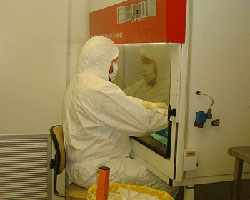Heart valve bank
The Bristol Heart Valve Bank began processing heart valves in 1995. Disease and congenital abnormalities can lead to defective valve function and cardiac insufficiency. One effective treatment in the case of aortic or pulmonary valve deficiencies is valve replacement.
There are three main options for valve replacement: mechanical valves, porcine valves and human allograft valves. Mechanical valves are extremely durable, but they cause damage to elements of the blood, which means that patients must remain on anticoagulant therapy.
Porcine valves
Porcine valves that have been treated with glutaraldehyde and mounted on a stent, have superior haemodynamic properties to mechanical valves, which means that long-term anticoagulant therapy is unnecessary, but these valves are prone to calcification within five to seven years.
Human allograft valves
The human allograft combines good haemodynamic properties with durability and resistance to infection. They are, therefore, the valve of choice for children and young women who may wish to have children. The valves, unlike cornea, can be cryopreserved, and are stored below -140°C for up to five years. Approximately 100 valves are supplied per annum.
